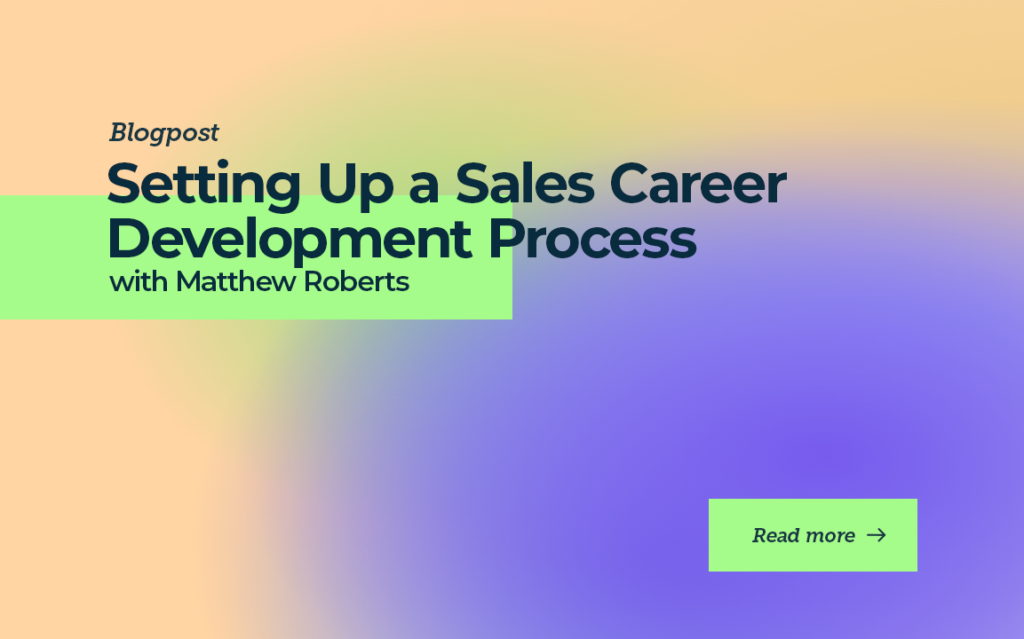Setting Up a Sales Career Development Process with Matthew Roberts

Sales are the driving force behind revenue generation and business growth. As such, a career in sales can be incredibly rewarding, both financially and professionally.
However, like any other profession, success in sales requires a structured and systematic approach to career development.
Matthew Roberts, Leading Sales Development at Mosaic, joins Collin Stewart on the Predictable Revenue podcast to discuss his expertise in the sales career development process and understanding employee motivation.
Sales Career Development Process
Salespeople are responsible for identifying potential customers, developing relationships, and ultimately closing deals. They must deeply understand the product or service they are selling, the market, and the competition. They must also be excellent communicators, able to persuade and influence others.
Acquire the necessary knowledge and skills
With this understanding in mind, the first step in sales career development is to acquire the necessary knowledge and skills.
This can be done through formal education, such as a degree in marketing or business, or through on-the-job training. Many organizations offer sales training programs, which can be a great way to learn the ropes and gain practical experience from the get-go.
Build a strong network of contacts
A strong network of contacts can provide valuable insights into the market and potential leads and opportunities.
You can start attending industry events and conferences, joining professional associations, and leveraging social media platforms like LinkedIn.
Setting clear goals and objectives
Establish measurable targets for sales volume, revenue, and customer acquisition. These goals should be challenging yet achievable and should be regularly reviewed and updated based on performance.
Continuous improvement
Seek feedback from managers and colleagues, attend training sessions and workshops, and keep up-to-date with industry trends and best practices.
The most successful salespeople are always looking for ways to improve their skills and knowledge.
Build a strong personal brand
Develop a reputation for excellence, build a strong online presence, and leverage social media to showcase achievements and expertise. A strong personal brand can help differentiate a salesperson from competitors and be a valuable asset in a competitive marketplace.
The sales career development process requires a structured and systematic approach.
Sales professionals should focus on acquiring the necessary knowledge and skills, building a strong network of contacts, setting clear goals and objectives, continuously improving their skills and knowledge, and building a strong personal brand. By following this process, sales professionals can build successful and rewarding careers in sales
Employee Motivation and Incentives
Employee motivation is critical to the success of any organization, and this is especially true in the sales industry.
Sales reps often face challenging targets, fierce competition, and a high-pressure work environment. Understanding employee motivation in the sales industry is necessary to maintain a motivated and engaged workforce.
Sales reps must have a clear understanding of the purpose and mission of the organization. When employees understand how their work contributes to the company’s overall success, they are more likely to feel motivated and engaged. This can be achieved through regular communication and transparency from senior management.
There are a few important factors to consider to help create and maintain employee motivation:
Incentive structure
Sales reps are often motivated by financial incentives such as bonuses, commissions, and performance-based rewards. Make sure that the incentive structure is fair and transparent and that salespeople feel that they are being rewarded for their efforts.
Work environment
A positive work environment, with supportive managers and colleagues, can help to foster motivation and engagement. Sales reps should feel that their contributions are valued and that they are part of a team working towards a common goal.
Recognition and feedback
People generally thrive on recognition for their achievements, whether it is a simple pat on the back or a more formal recognition program, and it’s also true of salespeople.
Regular feedback and coaching, which can be delivered via a continuous feedback platform, can help keep employees engaged and motivated by providing them with the guidance and support they need to improve their performance.
If you need help putting together a coaching program for your sales team, reach out to us to learn how we can help!
Personal development opportunities
Sales professionals who can develop their skills and knowledge through training and development programs are more likely to feel engaged and motivated. This can also help to improve their performance and increase their job satisfaction.
By focusing on these factors, you can create a positive and supportive work environment that fosters motivation and engagement among your sales team.

Implementing Gamification to Incentivize Sales Reps
In recent years, gamification has emerged as a popular method for motivating employees in the workplace. Organizations can boost engagement, improve performance, and enhance employee experience by incorporating game-like elements into work tasks and activities.
One of the key benefits of using gamification to motivate employees is that it taps into our natural inclination towards play and competition. Games are inherently motivating because they provide clear goals, feedback on progress, and a sense of accomplishment.
Tips for implementing gamification in your company:
- Identify clear goals and metrics – Before implementing a gamification program, it is essential to identify goals and metrics that align with the organization’s overall objectives. This will help ensure that the program is aligned with the company’s strategic priorities and that employees work towards meaningful outcomes.
- Provide meaningful rewards – For gamification to be effective, the rewards must be meaningful and relevant to employees. This can include financial incentives, recognition programs, or opportunities for personal development and career advancement.
- Ensure fairness and transparency – The rules and criteria for success must be clearly communicated, and all employees must have an equal opportunity to participate and succeed.
- Keep it fun and engaging – Incorporate elements of play and competition into work tasks and activities and provide regular feedback and recognition for progress and achievements.
Good Targeting or Good Messaging?
Both good targeting and good messaging are crucial elements for success.
Good targeting involves identifying and understanding your ideal customer, including their demographics, behavior patterns, and pain points. It’s essential to ensure that your product or service is tailored to meet the specific needs of your target audience.
However, even with the right targeting, you may struggle to close sales if your messaging is ineffective.
Good messaging involves crafting a compelling value proposition that communicates the benefits of your product or service to your target audience. Your messaging should speak directly to your customer’s pain points and offer a solution that resonates with them.
Ultimately, successful sales are a combination of good targeting and good messaging. By understanding your target audience and crafting a compelling message that speaks directly to their needs, you’ll be better equipped to build meaningful relationships with your customers and drive revenue for your business.
Smooth SDR to AE Transition
Transitioning from a Sales Development Representative (SDR) to an Account Executive (AE) role is an exciting and challenging step in any sales career.
This transition can be smooth and successful if the SDR and AE teams are aligned and clearly understand expectations and responsibilities.
The first and most crucial step in the transition process is alignment
SDRs and AEs need to understand each other’s expectations and responsibilities. It’s crucial to have an open communication channel between them, which will facilitate the exchange of information and ensure that all gaps are filled.
To achieve alignment, involving both teams in the transition process is essential. This can be done through regular meetings, training sessions, and mentorship programs.
SDRs should be given the opportunity to learn from AEs and understand their daily responsibilities. This will enable them to make more informed decisions about their career goals and aspirations.
On the other hand, AEs should be involved in the SDRs’ day-to-day activities to understand the sales process, the company’s target audience, and the product/service offering. This will enable them to identify potential gaps and areas for improvement and provide the necessary guidance and support.
The importance of education, training, and process improvement
SDRs should be provided with the necessary education and training to ensure they have the skills and knowledge to perform their tasks efficiently. This includes training on sales techniques, product knowledge, and CRM tools.
AEs, on the other hand, should be involved in the SDR team’s process improvement initiatives. This will enable them to identify areas for improvement, implement new strategies, and monitor progress. This collaborative effort will result in a more efficient and effective sales process, benefiting the company.
By involving both teams in the transition process and providing the necessary support, resources, and coaching, you can ensure that the SDR to AE transition is positive and successful.
Conclusion
Education, training, and ongoing support are critical for success in sales careers. Incorporating gamification techniques can be an effective way to engage and motivate employees to achieve overall success.
If you want to learn more about setting up a sales career development process, don’t miss this episode of the Predictable Revenue Podcast (find all the links below).
You can also get in touch with Matthew Roberts on his LinkedIn.
NO TIME TO READ?
Listen On:



